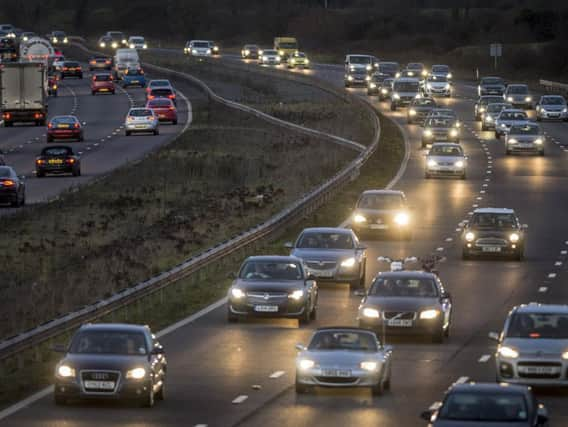New petrol and diesel vehicles to be banned from 2040 in bid to tackle pollution


He also pledged to work with local authorities developing "value for money and appropriately targeted" diesel scrappage schemes.
But the Cabinet minister warned authorities he does not believe it is "necessary" to bring in charges to prevent vehicles entering city centres, adding the Government will work with them to determine the approach.
Advertisement
Hide AdAdvertisement
Hide AdMr Gove's remarks came ahead of the Government's expected announcement of a £255 million fund to help councils speed up local measures to deal with pollution from diesel vehicles, as part of £3 billion spending on air quality.
The measures are set to be included in a court-mandated clean air strategy the Government is due to publish on Wednesday, just days before the deadline set by the High Court.
The expected move to ban petrol and diesel vans and cars follows similar plans announced in France this month and amid increasing signs that the shift to electric vehicles is accelerating.
Mr Gove told BBC Radio 4's Today programme: "We can't carry on with diesel and petrol cars, not just because of the health problems that they cause, but also because the emissions that they cause would mean that we would accelerate climate change, do damage to our planet and to the next generation."
Advertisement
Hide AdAdvertisement
Hide AdAsked if there was no alternative to more wind farms and nuclear power energy stations, Mr Gove replied: "There is no alternative to embracing new technology."
Told the Conservatives had a manifesto promise against more wind farms, Mr Gove said: "The Conservatives had a manifesto promise to ensure by 2050 there would be no diesel or petrol vehicles on our roads.
"Today we're confirming that should mean no new diesel or petrol vehicles by 2040, and critically President Macron in France has a similar aspiration... and Norway wants to reach that goal by 2025 so we are, quite rightly, in a position of global leadership in shaping the new technology."
Mr Gove, asked if there is a chance diesel vehicles may be banned from driving in certain polluted roads or areas in the future, replied: "Yes."
Advertisement
Hide AdAdvertisement
Hide AdHe added that outside London there are a "limited number of roads" which have too many diesel vehicles travelling on them, noting: " What we're announcing today is a package, more than £200 million, which will go to those local authorities in order to enable them to draw up appropriate plans in order to deal with some of the particular challenges they face.
"Those plans could include everything from changing the bus fleet - retrofitting buses so that they no longer emit some of these noxious fumes - but it could include, in specific areas, particular restrictions on drivers."
Mr Gove said it was up to local authorities to develop plans, encouraging them to develop "imaginative" solutions.
Pressed on charges to enter city centres and other areas with high air pollution, Mr Gove cited London Mayor Sadiq Khan's plan to introduce new charges before adding: "I don't believe that it is necessary to bring in charging but we will work with local authorities in order to determine what the best approach is.
Advertisement
Hide AdAdvertisement
Hide Ad"If a local authority believes that charging is necessary in order to secure compliance then we'll work to ensure that plan be implemented appropriately, but on the evidence I've seen while charging could bring local authorities in to compliance with the law, it's not necessary."
Mr Gove described charging as a "blunt instrument", adding he would prefer a "series of surgical interventions" as they are "fairer" to drivers and "likely to be more effective, more quickly".
On scrappage schemes, Mr Gove said previous ones have been "poor value for money" and noted people are already moving away from diesel cars.
He said: "If local authority areas, and the Mayor of London has prepared his own proposal, can come up with scrappage schemes that are value for money and appropriately targeted then we certainly have no ideological or theological objection to them, and I will work with any particular local authority area that believes a scrappage scheme would be effective and value for money."
Advertisement
Hide AdAdvertisement
Hide AdThe Government was ordered to produce new plans to tackle illegal levels of harmful pollutant nitrogen dioxide after the courts agreed with environmental campaigners that a previous set of plans were insufficient to meet EU pollution limits.
Despite Government efforts to delay publication of the plans until after the general election, ministers were forced to set out the draft plans in May, with the final measures due by July 31.
Campaigners have demanded the final plans should include Government-funded and mandated clean air zones, with charges for the most polluting vehicles to enter areas with high air pollution, as well as a diesel scrappage scheme.
Their calls for charging zones were backed up by an assessment published alongside the draft plans which suggested they were the most effective measures to tackle nitrogen dioxide, much of which comes from diesel vehicles.
Air pollution is linked to around 40,000 premature deaths a year in the UK, and transport also makes up a significant share of greenhouse gas emissions.